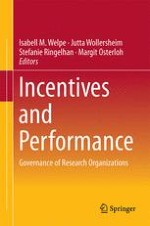2015 | OriginalPaper | Buchkapitel
Research and Teaching Awards as Elements of Incentive Systems in Academia
verfasst von : René Krempkow
Erschienen in: Incentives and Performance
Aktivieren Sie unsere intelligente Suche, um passende Fachinhalte oder Patente zu finden.
Wählen Sie Textabschnitte aus um mit Künstlicher Intelligenz passenden Patente zu finden. powered by
Markieren Sie Textabschnitte, um KI-gestützt weitere passende Inhalte zu finden. powered by
